The Concept
Innovation
Biointelligence is one of the most important innovation paths for a sustainable renewal of industrial production. Crucial to its development and application is the convergence of engineering, life sciences and information sciences.
Where we Stand Today
In addition to growing competition from other countries, companies are increasingly confronted with disruptive technologies that have the potential to completely displace existing business models.
Increasingly, the establishment of a sustainable economy is gaining strategic relevance. This is demonstrated by the consequences of climate change and the continued strong increase in global resource consumption.
If we want to succeed in developing an economic system that decouples growth from resource consumption, a radical change is necessary within a single generation. The biological transformation of industrial production is indispensable for this change.
© Universtiät Hohenheim
Biointelligence as a Sustainable Innovation Space
Biointelligence is ...
- ... the systematic networking of biological and technical systems through information technology.
- ... the intelligent, sustainable management of natural resources.
Biointelligent systems are a result of the biological transformation of production, that has three modes.
III: Biointelligent systems emerge from the comprehensive interaction of technical, informational, and biological systems (i.e. bio-, hard- and software). One example are intelligent, decentralized bioproduction cells (Smart Biomanufacturing Devices, SBMD) that produce biobased, personalized consumer goods and food, e.g., high-performance beds on house facades, 3D printing plants in the courtyard of an urban apartment building, bioreactors for the production of personalized drugs directly in the pharmacy.
II: Integration embeds biological in technical systems. Application examples include the use of microorganisms to recover rare earths from magnets, the functionalization of polymers, and the extraction of bioplastics from CO2-waste streams.
I : Inspiration , also called bionics, biomimicry, makes it possible to transfer biological phenomena that have evolved over millions of years to production systems without biology itself being part of the solution. In doing so, biomimicry analyzes, abstracts, and transfers principles from biology to the technical sphere. Companies use this approach to develop, for example, novel materials and structures for lightweight construction, new functionalities, and organizational and cooperation solutions (e.g. swarm intelligence, neural networks, evolutionary algorithms).

© Fraunhofer IPA
Through Biointelligence towards a Technology-
oriented Demand Economy
Today
Current production systems with complex, global supply chains are driving centralization at a wide variety of levels (housing, work, energy, food, medicine, etc.) and leading to worsening environmental problems (climate change, resource depletion, pollution, species extinction, etc.) as well as social imbalances (regional housing shortages, skills shortages, etc.).
Tomorrow
Biointelligent systems offer a counter design by forcing a technology-based transition to decentralized manufacturing of customized products. With their help, far-reaching new performance and benefit potentials can be tapped, and, at the same time, decisive disadvantages of current value and supply chains for standardized products can be overcome.
The Day After Tomorrow
Biointelligent systems shift the focus of value creation towards the user. Products will only be manufactured when they are needed. Consumers become producers. Decentralization leads to a massive reduction in the consumption of non-regenerative materials and emissions. People's individual footprint decreases to an ecologically acceptable level.
© Fraunhofer IPA
How the Biological Transformation is Made Possible ...
The biological transformation is made possible by a convergence of different technology areas that were previously considered separately - for example, materials technology, production technology, biotechnology, and information and automation technology. The convergence of these technology fields is leading to the development of so-called smart biomanufacturing devices making it possible to produce a wide variety of products independently on-site using the given biological resources.
Biointelligent on-demand production systems open up new economic sectors as cross-cutting technology that contributes to regional resilience, conservation of resources, sustainability, and respect for planetary boundaries, thus becoming an important component for ...
... the achievement of the UN's sustainability goals and the European Green Deal. They realize the shift of value creation in essential fields of human needs such as nutrition, health, housing, consumption, and energy more and more to the user, enablinge a technology-based demand economy.
© Fraunhofer IPA
... and Addresses the Needs of People
The development of biointelligence enables people to satisfy their needs in the fields of health, consumption, energy, housing and nutrition in an ecologically balanced way. With biointelligent production, for example, personalized healthcare, intelligent traffic, and production organization, and the decentralized production of consumer goods and food from renewable raw materials as well as recycled materials become feasible.
© Fraunhofer IPA

